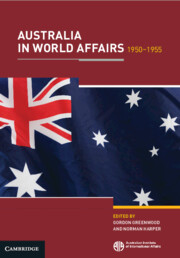II - The Commonwealth
Published online by Cambridge University Press: 29 March 2024
Summary
To write of the British Commonwealth is to write of things but half-expressed, of intangibles which so often make up the realities of life. At many points the forces and attitudes which operate are not easily susceptible to analysis. The responses are those which cannot be exactly measured. Such a view invites, and usually receives, criticism, especially from those without the Commonwealth. It is dismissed as nonsense or self-deception. No doubt there is not a little of both in the easy phrases of public pronouncement, but even when hedged about by qualification—the existence of material and security gains, divergences between member states and even between groups within a single member state—something remains which cannot be defined satisfactorily in constitutional, procedural, or material terms. The substance of the Commonwealth today is a blending of historical experience, sentiment, material interest and national advantage; and combined with these is the belief that voluntary association on a basis of freedom of decision represents a positive contribution to the defence of the dignity of the individual and to the creation of a more stable international society.
Keywords
- Type
- Chapter
- Information
- Australia in World Affairs 1950–1955 , pp. 29 - 91Publisher: Cambridge University PressFirst published in: 2024

